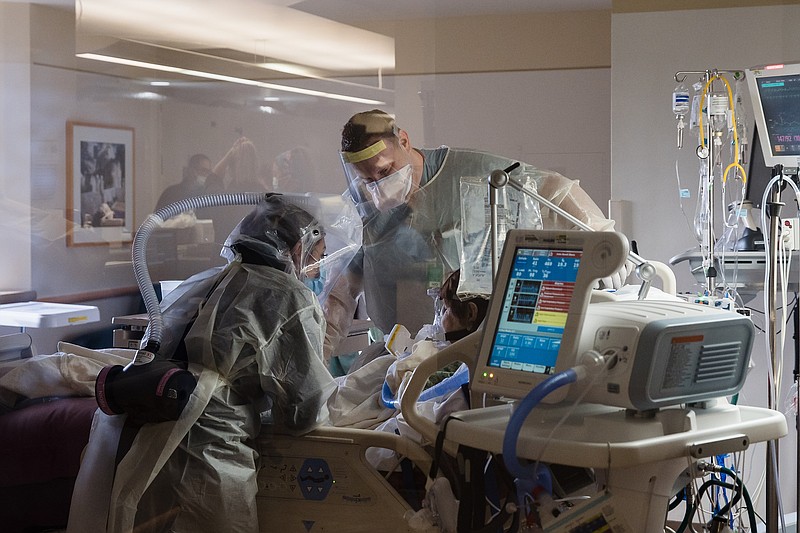As a pulmonary and critical care physician in Southern California treating hospitalized patients with COVID-19, I am noticing a rising tension. Beyond just being overwhelmed, we are now part of the collateral damage.
I recently asked a security guard to accompany me and an ICU nurse to meet the family of an unvaccinated 42-year-old firefighter who refused to accept that COVID-19 caused his respiratory failure. Adamantly refusing intubation despite worsening over weeks, it was only when his oxygen levels precipitously dropped and he complained of excruciating breathlessness that he accepted a breathing tube.
A dozen irate family members and friends now demanded answers. Because of visitation restrictions to limit contagion, they awaited me in lawn chairs outside the hospital. Through my N95 mask, I tried to explain in simple terms what was happening to their loved one. They hectored with incessant questions about test results, accusations of mistreatment and demands for therapies like vitamins, ivermectin and sedatives.
Warning repeatedly "not to lie," they recorded me with their camera phones. I tiptoed through a minefield of distrust. My careful medical explanations and efforts to connect empathically never landed. After 45 minutes, the three of us walked back into the hospital.
Once this would have been unbelievable, but it's becoming all too common. Endless months of rancor from COVID-skeptic patients and their families takes a psychological toll on front-line health care professionals. I'm seeing a new casualty: Worn down, many practitioners are compromising long-standing practice norms.
Among patients who disbelieve the experts about COVID-19, there is a familiar pattern. They get sick. They end up in the hospital with severe COVID-19 illness. They initially demonstrate a nonplussed defiance, which morphs into utter helplessness when they progressively worsen.
A 43-year-old woman insisted "it's just the flu" right up until she was begging to be intubated when oxygen masks failed to alleviate the panic caused by low oxygen levels. I pleaded with a 40-year-old man to accept my recommendations for care, only to have him grip my hand, look squarely in my eyes and say: "Feel my grip? I am strong. I am a man. Let me push through this." (He went on to accept intubation but died several weeks later.)
Incredulous families summarily deny that COVID-19 (and absence of vaccination) could be responsible for the critical illnesses I see every day. Patients and their relatives vehemently claim that health care workers and hospitals are "poisoning" and "punishing," as if part of an Orwellian plot, leading to belligerent, abusive behaviors against staff.
Far from "heroes" or even compassionate advocates for health, providers are viewed as biased technicians with dubious motives locking loved ones behind hospital doors.
One response to this emotional onslaught is, understandably, attrition. Most veteran ICU nursing staff where I work have left, replaced by temporary assignment nurses from across the country. Some physicians who have become ostracized by the very communities they serve now contemplate nonclinical work or early retirement.
There are no simple solutions, but there are many pieces to the puzzle: We health care providers must set realistic expectations early and throughout hospitalization. Hospitals must provide more palliative care, social work and other supportive services for patients and families. More and better public health messaging must combat medical misinformation. Medical systems and health care workers need more resources, more security, more public belief that we are all on the same side against a common viral enemy.
And to my colleagues who have been on the front lines: I am with you. Those of you who can come to work again tomorrow, please do, because we need you - not only to fight the virus, but also to uphold the principle that we share to do no harm.
Venktesh Ramnath is medical director of critical care and telemedicine outreach at UC San Diego Health.
The Los Angeles Times
